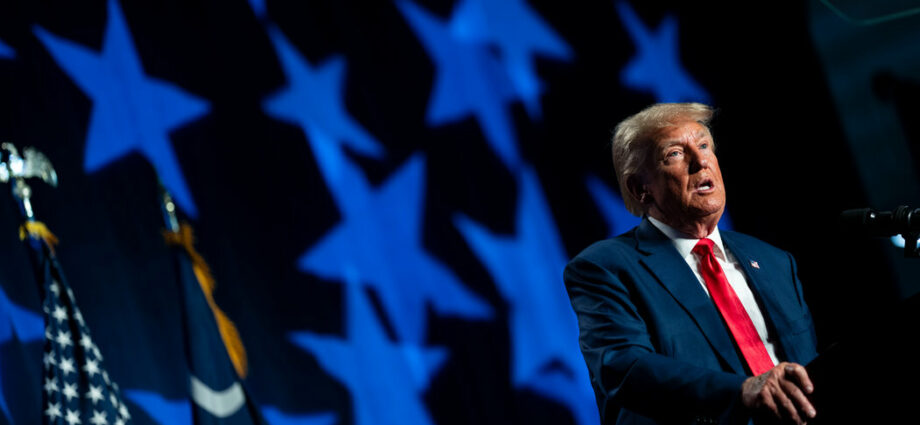Federal prosecutors pushed back on Monday against former President Donald J. Trump’s request to postpone his election interference trial in Washington until well into 2026, asserting that his main reason for the delay — the amount of evidence his lawyers have to sort through — was vastly overstated.
Mr. Trump’s lawyers, in an extremely aggressive move last week, asked Judge Tanya S. Chutkan, who is overseeing the case, to put the trial off until at least April 2026. That schedule would call for a jury to be seated nearly a year and a half after the 2024 election and almost three years after the charges against Mr. Trump were originally filed.
The lawyers said they needed so much time because the amount of discovery evidence they expect to receive from the government was enormous — as much as 8.5 terabytes of materials, they told Judge Chutkan, totaling over 11.5 million pages.
As part of their filing to the judge, the lawyers included a graph that purported to show how a stack of 11.5 million pages would result in a “tower of paper stretching nearly 5,000 feet into the sky.” That, the lawyers pointed out, was “taller than the Washington Monument, stacked on top of itself eight times, with nearly a million pages to spare.”
Responding to these claims in court papers on Monday, Molly Gaston, one of the prosecutors in the case, told Judge Chutkan that Mr. Trump’s characterization of the discovery evidence “overstates the amount of new and nonduplicative” material his lawyers will get and “exaggerates the challenge of reviewing it effectively.”
Ms. Gaston said that Mr. Trump should already be familiar with much of the materials, noting that about three million pages came from unnamed “entities associated with” him. Hundreds of thousands of other pages, she added, have been publicly available for some time — among them, “the defendant’s tweets, Truth Social posts, campaign statements and court papers involving challenges to the 2020 election by the defendant or his allies.”
Ms. Gaston also said that about one million pages of discovery came from the House select committee that investigated the attack on the Capitol on Jan. 6, 2021. That trove of evidence included hundreds of transcripts of interviews or depositions, a majority of which, she asserted, “are already public in redacted form.”
Moreover, Ms. Gaston said, the government turned over a large trove of materials — including more than three million pages of documents from the Secret Service — that “should not require substantial time or attention from the defense team.”
All of the material, she added, was given to Mr. Trump’s lawyers in a way that the defense could review quickly and easily “through targeted keyword searches and electronic sorting.”
Mr. Trump’s proposed trial date, Ms. Gaston wrote, “rests on the faulty assertion that it is necessary for a lawyer to conduct a page-by-page review of discovery for a defendant to receive a fair trial.”
“But the defendant can, should and apparently will adopt the benefits of electronic review to reduce the volume of material needed to be searched and manually reviewed,” she said.
Mr. Trump has made no secret in private conversations with his aides that he is looking to win the next election as a way to try to solve his array of legal problems. To that end, he has often sought to slow down prosecutors in all four of the criminal cases he is facing.
Indeed, if the former president, and the current front-runner for the 2024 Republican presidential nomination, can push his two federal trials — in Washington and Florida — until after the election and prevail, he could seek to pardon himself after taking office or have his attorney general dismiss the matter altogether.
Mr. Trump will not be able to pardon himself if he is ultimately convicted in Manhattan, where he faces state charges related to hush money payments to a porn star before the 2016 election. That is also true in Fulton County, Ga., where he stands accused with 18 co-defendants of tampering with the results of the election in that state.
Prosecutors in the office of the Justice Department’s special counsel, Jack Smith, filed their own election interference case against Mr. Trump this month in Federal District Court in Washington. That indictment accused Mr. Trump and six unidentified co-conspirators of three overlapping plots to defraud the United States, to disrupt the final certification of the election and to deprive people of their rights to have their votes counted.
Mr. Smith’s team has asked Judge Chutkan to set their case for trial in January. If that schedule holds — which is not a certainty — the federal election interference case would be the first to go before a jury.
Judge Chutkan is expected to consider — and perhaps issue a ruling — on the question of a trial date when the two sides meet for a hearing in her courtroom on Aug. 28.
The Manhattan case is set to go to trial in late March while Mr. Trump’s other federal case — one in which he stands accused of illegally retaining dozens of classified documents after leaving office — is scheduled to go to trial in Fort Pierce, Fla., in May.
Last week, Fani T. Willis, the district attorney of Fulton County, Ga., said she hoped to take Mr. Trump to trial in her case as early as March 4.
Alan Feuer covers extremism and political violence. He joined The Times in 1999. More about Alan Feuer
Source: Read Full Article
-
Lib Dems eyeing up Blue Wall seats in Tory heartlands
-
Gary Lineker row sparks furious demand for ‘dishonest’ BBC to axe TV licence fee
-
Warrington foodbank chief slams support ‘People should live not exist’
-
World Leaders Mourn Henry Kissinger
-
Undecided red wall voters could swing next election towards a Tory win

